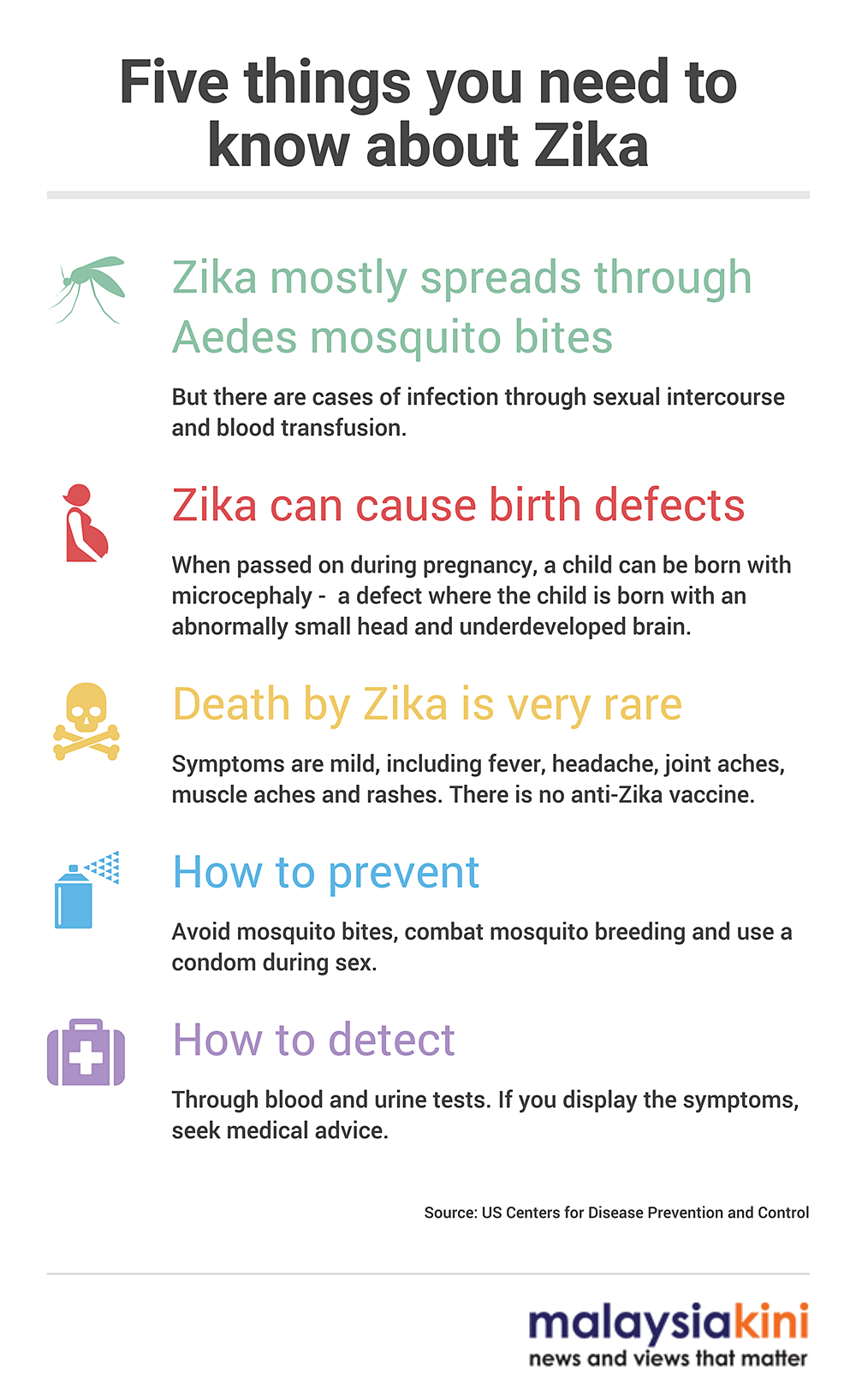KINIGUIDE Now that a Malaysian is suspected to be infected with the Zika virus, this new form of Aedes-borne viral disease has officially hit our shores. Here are some facts about it that you may need to know.
What is the Zika virus?
According to the World Health Organisation (WHO) website, the Zika virus is a mosquito-borne virus that can cause disease in human hosts once infection occurs. Its effects can range from mild illness to more debilitating health conditions and even death.
How is Zika virus spread?
Zika virus is primarily transmitted to people through the bite of an infected Aedes mosquito, which also transmits chikungunya, dengue and yellow fever.
Recent findings show that the Culex mosquito may also transmit Zika.
The virus can also be transmitted through sex and has been detected in semen, blood, urine, amniotic fluids, saliva as well as body fluids found in the brain and spinal cord.
What are its symptoms?
The virus usually causes mild illness.
Symptoms that may appear a few days after being bitten are:
- Headache;
- Slight fever;
- Rash;
- Conjunctivitis (inflammation of the underside of the eyelid);
- Muscle and joint pain;
- Tiredness.
The symptoms usually last from two to seven days, though incubation periods may vary.
There is no known difference in the symptoms of infected pregnant and non-pregnant women.
What else can Zika cause?
Other than its symptoms, scientific consensus is that Zika virus can cause microcephaly, or children being born with unusually small heads, and Guillain-Barré syndrome, a neurological disorder that can lead to paralysis and death.
However, recent research have showed that Zika virus may also affect healthy adults.
In a study published in the Cell Stem Cell journal, researchers from Rockefeller University and La Jolla Institute for Allergy and Immunology found that Zika virus can damage brain stem cells in adult mice.
This leads to reduced brain volume and complications in brain function.
An understanding on the full extent of how Zika virus can impact humans is an ongoing development as many research is relatively new.
How is Zika virus disease diagnosed?
Diagnosis is based on symptoms and the patient’s lifestyle and/or travel history, taking note of:
- Recent mosquito bites;
- Living in mosquito breeding areas;
- Travel to areas where Zika virus occurs;
- Close physical contact with Zika patients;
- Sex with Zika-infected patients or in areas where Zika virus occurs.
Laboratory testing can confirm the presence of Zika virus in the blood as well as urine and other bodily fluids.
How is Zika virus disease treated?
The symptoms of Zika virus disease can be treated with common pain and fever medicines, rest and plenty of water.
If symptoms worsen, people should seek medical advice.
How to prevent the spread of Zika virus?
To lower the risk of being infected with Zika virus, travelers and those living in affected areas should take these basic precautions.
Prevent mosquito bites.
- Wear light coloured clothes that cover as much of the body as possible.
- Use physical barriers such as window screens or keep doors and windows shut.
- Sleep under mosquito nets.
- Use insect repellent containing DEET, IR3535 or icaridin (Follow product label instructions).
Destroy breeding grounds.
- Cover, empty or clean potential mosquito breeding sites such as buckets, drums, pots, gutters, and used tyres.
- Health authorities may also advise that spraying of insecticides be carried out.
Practise safe sex.
- Those living in affected areas should use condoms or other forms of prophylactics, or abstain from sex altogether.
- Those returning from Zika virus affected areas should practise safe sex or abstain for eight weeks.
- Those with symptoms should practise safe sex or abstain for six months.
- Sexual partners of pregnant women should practise safe sex or abstain for the duration of the pregnancy.
- Couples in affected areas are advised to wait eight weeks before trying to conceive, six months if both have symptoms.
Source: Zika primer on the World Health Organisation website.


